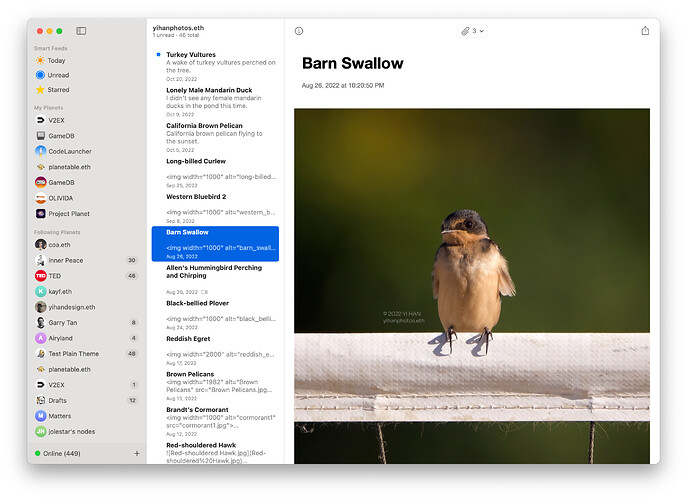We post here per @slobo.eth and @neiman
Author: @planetable.eth
Date: October 2022
Project: Planetable.xyz
What is Planetable.xyz?
Planet is a native macOS app for building, browsing, and following dWeb content on IPFS + ENS. It’s a GUI consisting of a dWeb content reader, a two-column markdown editor, a static website generator, and a built-in IPFS node.
Rationale
- Among all the methods to host a website for ENS, IPFS is the current most popular one. But to use IPFS for ENS, users will need to learn commands of IPFS or use a centralized service like Fleek. Planet provides a native macOS app for users to build and host websites for ENS, all from their Mac. It is an all-GUI experience with no CLI involved. Websites built with Planet are hosted with a local built-in IPFS node. Third-party services like Filebase.com or Crust Network can be utilized for better availability and performance but are optional.
- Planet also can be used as a reader to follow content updates of ENS. For example, you can use Planet to follow the latest updates from
vitalik.eth. When following, Planet pin the IPFS CID locally. Thus it makes the content available offline, and it also makes the content more reachable to other users. Since it uses IPFS peer-to-peer communication for fetching ENS website content, it is resistant to many censorship efforts on HTTP and DNS.
With the self-hosted local-first architecture outlined above, Planet is a fully decentralized solution to build and host websites for ENS.
Recent Updates
Since the initial launch in June, we have kept shipping new features every month. Here are some latest:
- Video and audio content support. Generate a podcast.xml that can be subscribed to by Podcast clients like Castro, Overcast, and Apple’s Podcast app.
- Two-column Markdown editor with live preview. Easily attach or drag-n-drop pictures, video, audio, or any useful attachments like PDF.
- Integration with Filebase.com IPFS pinning service for better performance and availability.
- Publish any local folder as IPNS. Hence the app can work with static website generators like Jekyll, Hugo, Zola, etc. Making it easier to link static sites to ENS.
- Integrations with various ecosystem projects: dWebServices.xyz for hosted IPNS records. Plausible.io for privacy-focused traffic analytics. WorldWideWeb, a macOS web server from the Iconfactory, for quickly previewing template changes.
- Template engine and two built-in templates.
- ENSKit: A Swift library for reading addr, contenthash, and text records from the ENS contract. When we started this project, we needed a Swift library for ENS, but most of the existing tooling was in JS/TS. So we built a Swift library for ENS.
- A tutorial website about creating and linking websites for ENS: Planet
Roadmap
- Add WalletConnect to enable tipping for content on ENS.
- Implement more interactions between ENS dWeb: likes, emoji reactions, and comments.
- Create more tutorials on how to build a richer dWeb on ENS.
- Build more beautifully designed site templates.
- Integrate with more pinning services. People who tried IPFS usually thought it was slow, but a ubiquitous pinning network would eliminate that slowness. That would also make ENS websites faster.
- iOS version for creating and following ENS dWeb on mobile devices.
Links
- Website: https://planetable.xyz/
- GitHub: GitHub - Planetable/Planet: Build and host decentralized blogs and websites on your Mac
- Swift Library for ENS: GitHub - Planetable/ENSKit: Swift library for Ethereum Name Service
- Community: https://nftychat.xyz/community/568aefe
- Twitter: https://twitter.com/PlanetableXYZ
- Discussion on ENS Discourse: Planetable.xyz - Native macOS App for Building dWebsites on IPFS + ENS
Steward Commentary: In consultation with the .eth website subgroup, we have agreed on a grant of 10,000 USDC for @planetable.eth. Planetable brings ENS to MacOS users and to the blogging community, with hundreds of blogs already created by their tool. Planetable continuing efforts to integrate with as many tools as possible, tie the ENS ecosystem together. We’re looking forward to seeing what Planetable will do next.
